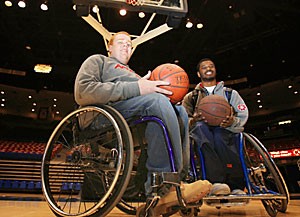One court, one ball, two nets.
There may not be any dunking, but the game is still the same. The game is wheelchair basketball, and two of the most competitive athletes picked to represent the United States Down Under are freshman guards Brendan Downes and Eric Harris.
Besides the use of double dribbling in the wheelchair version of the game, the sport is essentially identical, Downes said.
“”We play on the same size court,”” Downes said. “”We have 3-pointers. There’s traveling.””
Downes and Harris are among 12 players selected to represent the United States and compete in the 2006 Australian Junior Under 20 National Basketball Championships, which will be held in Brisbane, Australia, April 7-12.
Harris, who had been picked to be a part of last year’s team as well, couldn’t go at the time because of prior commitments.
But when this year’s team was announced in late September, Harris and his parents were ecstatic to hear that he had been selected again, he said.
And this time, he’ll play.
“”When I found out I was selected I was still really, really excited,”” Harris said.
Downes, who played for the team last year in Australia, said he was also happy to hear he was selected again.
The selection came as no surprise, said Arizona wheelchair basketball head coach Derek Brown.
“”They are the two top young players in the country, and they work very well together,”” Brown said. “”They definitely have different styles and they complement each other really well.””
And considering neither of them has played that long, it’s quite an achievement.
Harris said although he had played able-bodied basketball when he was able to walk with braces, it wasn’t until three years ago that he began playing wheelchair basketball.
“”I was a sophomore in high school and tried out for my high school golf team and didn’t make it,”” Harris said. “”So my dad looked for other sports for disabled (athletes) online, and that’s where we found basketball.””
Brown said Harris’ rise to the top of the game is due to his work ethic.
“”I think a lot of it has to do with Eric’s dedication and mental approach to the game,”” Brown said. “”I think he takes the game very seriously, and he enjoys it.””
Downes, on the other hand, said he never even picked up a basketball until sixth grade, when he first got into a wheelchair after losing muscle mass due to surgery in his legs.
“”I never touched a basketball until (then),”” Downes said.
From there Downes said he spent one game on the prep division level, one tournament on the junior varsity level, and then moved straight up to varsity.
“”Nobody has ever come onto varsity level until they were in ninth grade,”” Downes said.
Still, even with their obvious athletic talent, a lot of people don’t give disabled athletes credit, Harris said.
“”We work and train just as hard as any other athlete at this school,”” Harris said. Said Downes: “”It’s really rigorous. I mean the basketball players we have here have to be in shape, don’t get me wrong, but we have to be in double the amount of shape because we have to be pushing the entire game.””
Some people don’t even know wheelchair sports exist, Harris said.
“”I’ve asked some disabled people at this school, ‘did you know we have a wheelchair basketball team?'”” Harris said. “”They didn’t know.””
But if people like watching basketball, they will love wheelchair basketball, Downes said.
One such fan agreed.
Tina McCrea, a speech, language and hearing sciences sophomore, said she didn’t know much about the sport until this year, when she started watching it for the first time.
“”I didn’t realize how amazing it was,”” McCrea said. “”I always wondered how it worked and I realized it is a lot harder work than I thought.””
Harris agreed.
“”My dad thought it was going to be easy, so he got in a chair and tried it out, Harris said. “”Now he’ll never try it again.””
The sport is getting more popular, Downes said, especially in the college ranks.
“”Two years ago there were six teams, now there’s almost 12,”” Downes said.
And the 2005 film “”Murderball,”” a documentary about quad-rugby, has definitely helped shine a light on wheelchair sports, Harris said.
“”They’ll always ask if we play ‘murderball,'”” Harris said, laughing.
But basketball is truly their favorite sport, and it has helped both of these athletes in their everyday lives.
Before basketball, Harris said he was really nervous and scared about a lot of things.
But the sport put things in perspective, Harris said.
“”When I play basketball, no matter what else is going on, it always makes me happy,”” Harris said.
Said Downes: “”Everything else that happens outside, stops right there at the baseline.””









